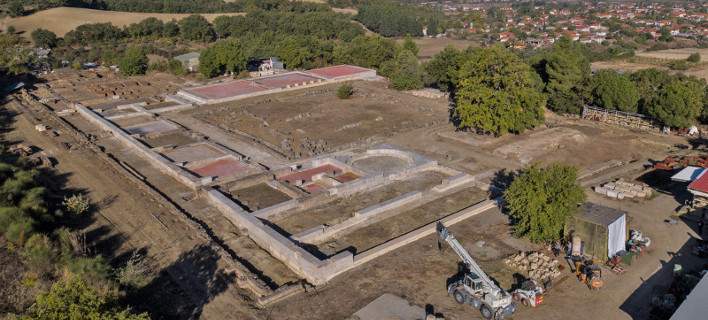This 2,300-year-old landmark, formerly the Royal Metropolis of the Macedonians and the site where Alexander the Great ascended to the Macedonian throne, stands as a testament to the grandeur of classical Greece.
Built primarily by Phillip II of Macedonia in the fourth century, this monumental structure represents a crucial part of Greece’s cultural heritage.
The extensive restoration, supported by the Greek government and the European Union, involved the meticulous preservation of over 1,400 meters of marble flooring, columns, and intricate mosaic art.

The reopening ceremony witnessed Greek Prime Minister Kyriakos Mitsotakis emphasizing the global importance of such monuments, highlighting their significance as not only local treasures but also belonging to humanity. Mitsotakis stressed the responsibility to safeguard, promote, and cherish this invaluable cultural heritage.
Three times the size of the Parthenon, this palace serves as a symbol of urban planning advancement and influenced subsequent Hellenistic period palaces.
Designated as a UNESCO World Heritage Site alongside the nearby tombs of Philip and other Macedonian rulers, the Palace of Aigai stands as a beacon of historical richness and architectural brilliance, inviting visitors to delve into the captivating legacy of ancient Macedonia.
Historic and Archaeological Importance of the Palace of Aigai

The ancient city of Aigai, discovered in the 19th century, was the royal capital of Macedon, situated in modern Northern Greece. It held significant historical importance as the root of the Temenid dynasty, including figures like Philip II and Alexander the Great.
The archaeological site of Aigai, encompassing an urban center and surrounding settlements, is delimited by natural features like rivers and mountains. It serves as a crucial source of information on ancient Macedonian culture, history, and society.
Notable excavations have unveiled impressive structures like the monumental palace, a grand classical Greek building, along with a theater, sanctuaries, city walls, and a vast royal necropolis with over 500 tombs, some belonging to prominent figures such as Philip II and Alexander IV. The quality of these findings has placed Aigai among Europe’s most significant archaeological sites.
Who was Alexander The Great?

Alexander the Great, king of Macedon, took the throne at 20 and built a vast empire from Greece to northwest India by 30. He’s renowned as an undefeated military leader, creating one of history’s largest empires.
Alexander, tutored by Aristotle until 16, swiftly took control of Macedon and led campaigns in the Balkans, reclaiming territories and defeating Thebes. He united the Greeks under the League of Corinth and pursued his father’s plan to conquer Persia, becoming the leader of the Greek forces.
In 334 BC, Alexander embarked on a decade-long campaign, conquering Asia Minor and decisively defeating Achaemenid Persia, ultimately seizing the empire. His realm stretched from the Adriatic to the Indus after Persia fell.
He aimed for further conquests, reaching India and winning battles, but turned back due to his troops’ desire to return home. His death in Babylon in 323 BC halted his plans for military expeditions, triggering civil wars and the fragmentation of the Macedonian Empire under the Diadochi.
Alexander’s death heralded the Hellenistic era, fostering cultural blending like Greco-Buddhism and Hellenistic Judaism.
He established numerous cities, notably Alexandria, spreading Greek culture extensively, shaping the dominant Hellenistic civilization, influencing even the Indian subcontinent.
This period evolved through the Roman Empire, shaping modern Western culture, with Greek as a key language until the Byzantine Empire’s collapse.
Alexander gained legendary status akin to Achilles, admired for his military prowess, inspiring leaders throughout history, and making his tactics a focus in military education globally.
(eTN): Revolutionary Palace of Aigai Reopens after 16 Years: Why Is It Important? | re-post license | post content























